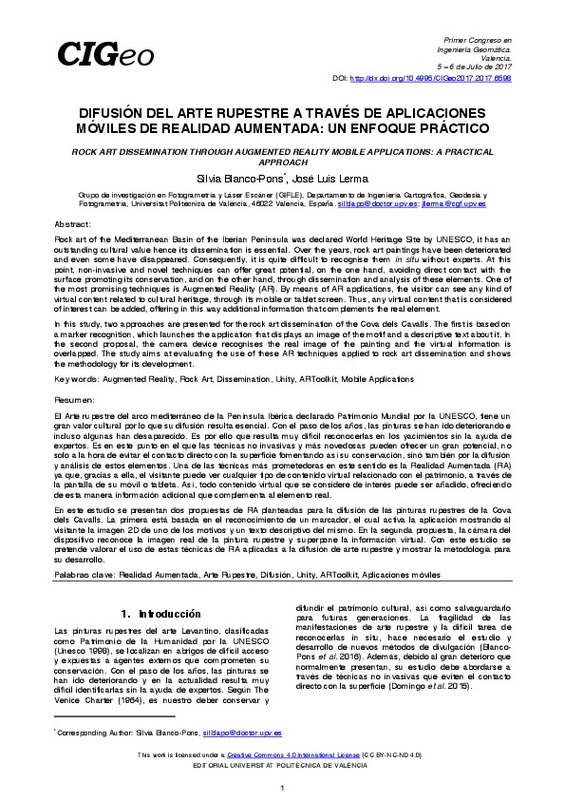|
Resumen:
|
[EN] Rock art of the Mediterranean Basin of the Iberian Peninsula was declared World Heritage Site by UNESCO, it has an
outstanding cultural value hence its dissemination is essential. Over the years, rock art paintings ...[+]
[EN] Rock art of the Mediterranean Basin of the Iberian Peninsula was declared World Heritage Site by UNESCO, it has an
outstanding cultural value hence its dissemination is essential. Over the years, rock art paintings have been deteriorated
and even some have disappeared. Consequently, it is quite difficult to recognise them in situ without experts. At this
point, non-invasive and novel techniques can offer great potential, on the one hand, avoiding direct contact with the
surface promoting its conservation, and on the other hand, through dissemination and analysis of these elements. One of
the most promising techniques is Augmented Reality (AR). By means of AR applications, the visitor can see any kind of
virtual content related to cultural heritage, through its mobile or tablet screen. Thus, any virtual content that is considered
of interest can be added, offering in this way additional information that complements the real element.
In this study, two approaches are presented for the rock art dissemination of the Cova dels Cavalls. The first is based on
a marker recognition, which launches the application that displays an image of the motif and a descriptive text about it. In
the second proposal, the camera device recognises the real image of the painting and the virtual information is
overlapped. The study aims at evaluating the use of these AR techniques applied to rock art dissemination and shows
the methodology for its development
[-]
[ES] El Arte rupestre del arco mediterráneo de la Península Ibérica declarado Patrimonio Mundial por la UNESCO, tiene un
gran valor cultural por lo que su difusión resulta esencial. Con el paso de los años, las pinturas ...[+]
[ES] El Arte rupestre del arco mediterráneo de la Península Ibérica declarado Patrimonio Mundial por la UNESCO, tiene un
gran valor cultural por lo que su difusión resulta esencial. Con el paso de los años, las pinturas se han ido deteriorando e
incluso algunas han desaparecido. Es por ello que resulta muy difícil reconocerlas en los yacimientos sin la ayuda de
expertos. Es en este punto en el que las técnicas no invasivas y más novedosas pueden ofrecer un gran potencial, no
solo a la hora de evitar el contacto directo con la superficie fomentando así su conservación, sinó también por la difusión
y análisis de estos elementos. Una de las técnicas más prometedoras en este sentido es la Realidad Aumentada (RA)
ya que, gracias a ella, el visitante puede ver cualquier tipo de contenido virtual relacionado con el patrimonio, a través de
la pantalla de su móvil o tableta. Así, todo contenido virtual que se considere de interés puede ser añadido, ofreciendo
de esta manera información adicional que complementa al elemento real.
En este estudio se presentan dos propuestas de RA planteadas para la difusión de las pinturas rupestres de la Cova
dels Cavalls. La primera está basada en el reconocimiento de un marcador, el cual activa la aplicación mostrando al
visitante la imagen 2D de uno de los motivos y un texto descriptivo del mismo. En la segunda propuesta, la cámara del
dispositivo reconoce la imagen real de la pintura rupestre y superpone la información virtual. Con este estudio se
pretende valorar el uso de estas técnicas de RA aplicadas a la difusión de arte rupestre y mostrar la metodología para
su desarrollo.
[-]
|









